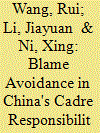| Srl | Item |
| 1 |
ID:
181136


|
|
|
|
|
| Summary/Abstract |
This article contends that prior research on the behaviour of Chinese local cadres pays limited attention to their motivation for avoiding blame. Using qualitative data from three field studies conducted in Guangdong province, the study focuses on blame avoidance in the cadre responsibility system, which is recognized as an important instrument for state capacity building. Our analysis uncovers three major discursive strategies used by grassroots cadres to manage blame either before or after it is apportioned: de-legitimating performance standards, re-attributing blame and transferring blame risk. We find that local cadres have a role as blame makers in shifting blame and accusations. This finding challenges the conventional view, which typically sees local officials as blame takers. The article concludes by elaborating on the wider implications of this finding and proposing avenues for future research.
|
|
|
|
|
|
|
|
|
|
|
|
|
|
|
|
| 2 |
ID:
185001


|
|
|
|
|
| Summary/Abstract |
Governments must fight corruption to maintain legitimacy. However, anti-corruption campaigns do not necessarily convince citizens that corruption is less prevalent. This study analyzes how variations in the content of anti-corruption information reported in the media affect perceptions of corruption. We conduct a survey experiment in China and find that information about corruption cases, which is often sensational and thus disseminates rapidly, may have a negative impact on public perceptions of corruption by exposing more corruption. By contrast, information on routine anti-corruption work, which is less dramatic, may positively influence perceptions of corruption. This study advances our understanding of corruption perceptions and has practical implications for controlling and preventing the practice.
|
|
|
|
|
|
|
|
|
|
|
|
|
|
|
|